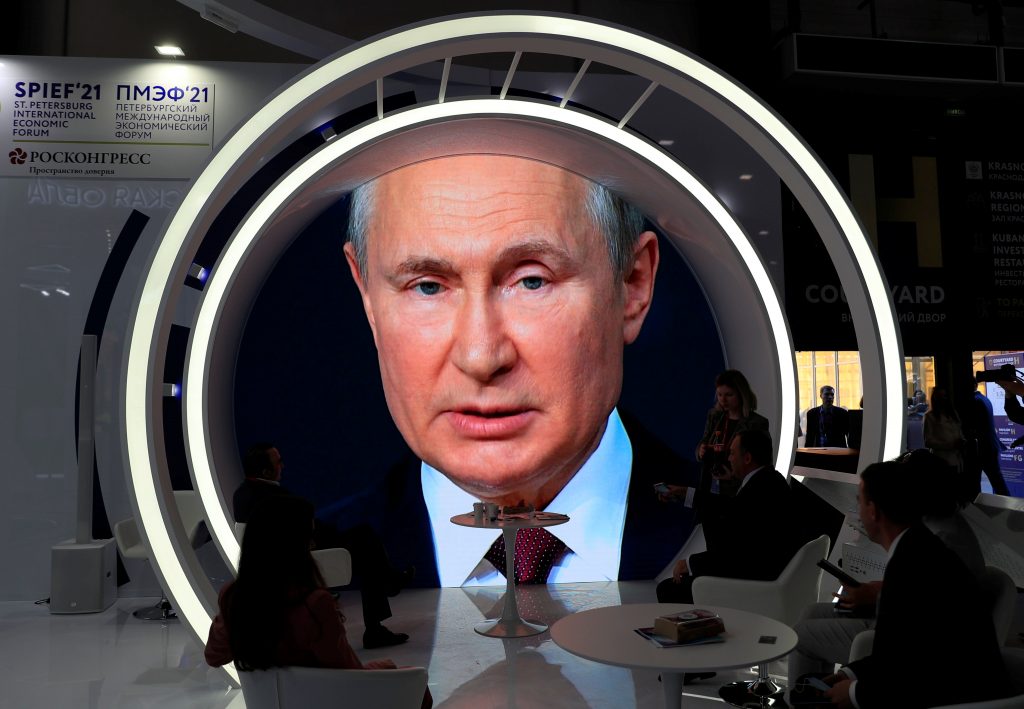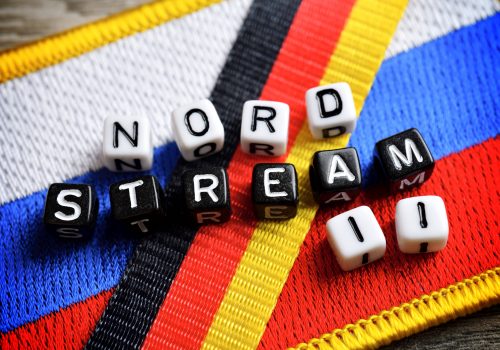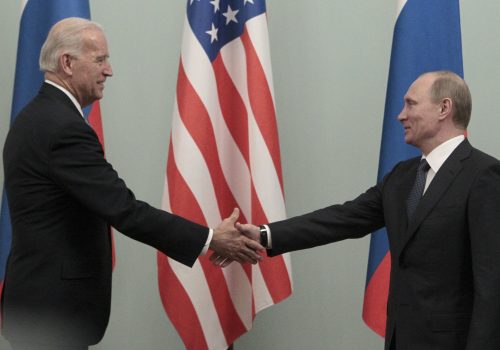Summarizing the recent developments in the Russian Nord Stream 2 pipeline saga is as easy as recalling the words of legendary NFL coach Dennis Green: “They are who we thought they were, and we let them off the hook.”
For nearly seven consecutive years, Transatlantic national security analysts have warned that the proposed Nord Stream 2 pipeline would be used as a geopolitical weapon by Russian President Vladimir Putin to undermine the economic and strategic stability of Ukraine and the broader European community. Those same experts have repeatedly pointed to the Kremlin’s use of similar projects to proliferate its strategic corruption and elite capture throughout Europe.
As a result of these concerns, experts on both sides of the Atlantic have vociferously called for Nord Stream 2 to be stopped. The project has been vehemently opposed by a broad majority of Transatlantic leaders. This opposition has come from three consecutive US administrations (with consistent bipartisan support in Congress), along with statements by Canada, the United Kingdom, Denmark, Sweden, and nearly every nation along NATO’s eastern flank.
Meanwhile, the European Parliament itself has warned of the project’s dire impact if completed, and has called for its outright cancellation in resolutions passed by overwhelming majorities in Brussels on at least three occasions. In light of this opposition, it was hardly surprising that, the moment Washington’s resolve to stop the project appeared to weaken, Putin publicly reinforced his malign plans for the pipeline.
Recall that in late May, the Biden administration announced it would not fully implement mandatory US Congressional sanctions aimed at stopping the project by issuing a national interest waiver for the Gazprom-controlled parent company, Nord Stream 2 AG, and its CEO, longtime Putin crony and ex-Stasi officer Matthias Warnig.
Right on cue, less than two weeks later, Putin stood on the stage of the St. Petersburg International Economic Forum and touted the completion of the first of the two parallel lines comprising Nord Stream 2. Even though details of this claim were quickly debunked, Putin got just what he was looking for: a press-cycle momentum boost for his marquee energy project.
Putin then seriously undercut the credibility of claims that Nord Stream 2 is “just a commercial deal” by issuing a thinly veiled threat to suspend Ukrainian gas transit in future if officials in Kyiv do not display sufficient “good will” toward the Kremlin.
If this did not sufficiently drive home the strategic intention behind the Kremlin’s plans to end Ukrainian gas transit, Putin then placed the economic threat in more conventional military terms, railing that Ukraine should “spend money not in order to maintain the army and aim it at solving the problems of the Donbas by force, but in order to improve the economy, work with people. Do you understand?”
Yes, Vladimir, the Transatlantic coalition opposing Nord Stream 2 does understand. Opponents have been warning for years that should the pipeline be completed, it would be used to end or drastically reduce gas transit via Ukraine.
Should this happen, Kyiv’s vulnerable economy would be significantly undermined. Even more significantly, Moscow would no longer be dependent on Ukraine for the transit of gas supplies to Europe. This would remove a major strategic deterrent that currently prevents Russia from escalating its ongoing military aggression against its neighbor.
Stay updated
As the world watches the Russian invasion of Ukraine unfold, UkraineAlert delivers the best Atlantic Council expert insight and analysis on Ukraine twice a week directly to your inbox.
While the move to let the Nord Stream 2 parent company off the hook by a sanctions waiver undercut the Biden administration’s efforts to stop the malign objectives of the pipeline, its decision to waive sanctions on the Nord Stream 2 CEO sent an equally concerning signal.
As I wrote recently for CEPA, President Biden’s own laudable goals of combating Russian malign influence, strategic corruption, and global kleptocracy have been undermined by the move to indicate that, while Warnig was indeed engaging in sanctionable activities, sanctions on him would be waived, in part due to fear that the move would lead to a deterioration in the US-German relationship. Not only does Warnig have a long resume of working on the board of a variety of Russian state-owned enterprises and banks; he was named in Russian opposition leader Alexei Navalny’s early 2021 anti-corruption video as a key figure in Putin’s orbit of corruption.
Electing to identify Warnig but failing to take action against him has sent an implicit signal that the West is still unwilling to oppose the so-called “Schroederization of Europe.” No more than two weeks after the sanctions waiver was announced, former Austrian Foreign Minister Karin Kneissl accepted an appointment to the board of Kremlin-controlled oil enterprise Rosneft. This came following her post-government stint as commentator for Russian propaganda network RT, and after she infamously invited Putin to her wedding.
In early June, former French Prime Minister François Fillon, long known for his pro-Putin views and calls to end EU sanctions on the Kremlin, was nominated by Russian authorities to be the “representative of the Russian Federation” on the board of directors of Russian state-owned oil group Zaroubejneft. The announcement sparked fresh outrage on both sides of the Atlantic over Fillon, who just last year was sentenced to prison time for embezzling French public funds, with the term “Fillonisation” quickly joining “Schroederization” in the lexicon of Russian elite capture in Europe.
The fact that this appointment came just before the Biden administration’s declaration establishing the fight against corruption as a core US national security interest again points to the scale of the task the administration faces in order make real progress in combating Russian and Chinese elite capture and strategic corruption. Both nations already use this strategy, whether via Russia’s energy exports or China’s critical infrastructure deals in Europe. Waiving sanctions on Warnig will will only embolden Moscow and Beijing further.
With these dynamics in mind, there have been widespread calls for the reversal of the waiver decision coming from top Democratic Biden allies and Republicans across Capitol Hill, as well as from many US partners in Central and Eastern Europe.
Democratic Senator and Senate Foreign Relations Committee chair Bob Menendez issued an irate press release, urging “the Administration to rip the Band-Aid off, lift these waivers and move forward with the Congressionally-mandated sanctions.”
Democratic Senator Jeanne Shaheen echoed Menendez, calling on the Administration to use “every option available to prevent [Nord Stream 2] completion,” while Democratic Representative Marcy Kaptur led a bipartisan statement expressing “deep concern that the Administration has invoked the US national interest waiver to waive sanctions against Gazprom subsidiary Nord Stream 2 AG, and its CEO, Matthias Warnig, a Putin crony and former Stasi goon.”
Meanwhile, 14 Republican Senators have issued a fresh Nord Stream 2 sanctions bill that would immediately impose mandatory sanctions on Nord Stream 2 AG and Warnig, with Democratic Senator Shaheen indicating that more sanctions are expected from Congress this year.
Further indications of Congressional concern over the Biden Administration’s Nord Stream 2 policy came during the testimony of Secretary of State Antony Blinken before the Senate Foreign Relations Committee. On a bipartisan basis, Senators made clear that their concerns with Nord Stream 2 are unwavering and took center stage in what was supposed to be a routine budget hearing.
In fact, almost half of the Senators that asked questions raised concerns about Nord Stream 2, including Senators Menendez (D-NJ), Risch (R-ID), Shaheen (D-NH), Johnson (R-WI), Barrasso (R-WY), Merkeley (D-OR), Cruz (R-TX), and Portman (R-OH). This reflects the Congressional understanding regarding the national security threat that a completed Nord Stream 2 would pose to the Transatlantic community. After all, during such hearings, Senators can and do raise issues spanning the entire globe.
European governments have also expressed concern, including a Polish statement that Warsaw will “continue to count on the United States to take decisive action to stop the construction of Nord Stream 2; it is still not too late.”
And during an impassioned interview with Deutsche Welle, former Polish Minister of Foreign Affairs Radek Sikorski warned, “Russian gas corruption is now coming to Germany. They have already corrupted your former Chancellor, Mr. Schroeder, and now there will be more gas, more money, and more corruption.”
Eurasia Center events

In spite of the direct impact the project would have on Central and Eastern Europe, both Ukrainian President Volodymyr Zelenskyy and current Polish Foreign Minister Zbigniew Rau claimed in recent days that they learned of the Biden Administration’s decision to waive sanctions on Nord Stream 2 AG and its CEO via the press rather than high-level consultations. Inevitably, this has fueled concerns of an “about us, without us” deal between Washington and Berlin.
All of this came as the White House reportedly received a high-level German delegation for bilateral negotiations on the future of Nord Stream 2. While Germany’s Handlesblatt reported that the negotiations did not lead to any agreements, during his testimony, Secretary Blinken hinted at topics under discussion including “snapback” mechanisms which would see the German government shut down Nord Stream 2 if the Kremlin cuts off Ukraine.
As I have previously written in these pages , talk of a German shutoff mechanism for the project lacks credibility. Any agreement must secure real, verifiable behavior changes from the Kremlin to increase the security of NATO’s Eastern Flank. For this to happen, the Biden Administration should state unequivocally that if these issues are not addressed soon, waivers on Nord Stream 2 AG and Warnig will be lifted, which could have the likely impact of stopping the project outright.
Thankfully, during his testimony, Secretary Blinken indicated that this is indeed a direction the Administration is considering. Facing bipartisan Congressional pressure to stop the project, Blinken affirmed that the Nord Stream 2 AG and CEO “waiver can be rescinded at any time,” and also clarified that while he had previously pointed to physical construction being near completion, that “even when the pipeline is physically complete, for it to go into operation, it still requires insurance and permits, and we are looking very carefully at all of that.”
Blinken is right. Even with the progress Russian vessels have been able to make in the face of US sanctions designations toward the physical connection of the two strings of Nord Stream 2 in the last few months, the struggle to complete the project is far from over. Indeed, after physical completion of the pipeline, it will still take many months to complete the pre-commissioning, commissioning, and certification work before the project can be approved to deliver gas.
Existing mandatory US sanctions aimed at stopping Nord Stream 2 from coming into operation already include the provision for designations of insurance and certification providers, which could pose a significant hurdle for the Kremlin. In other words, even if the project is physically completed, there remain many US sanctions and EU regulatory steps that could be taken to ensure that the project never comes into operation.
Let’s be clear: the Biden Administration has taken many excellent steps to revitalize the Transatlantic relationship. However, the decision to issue waivers to Nord Stream 2 AG and its CEO has created a great deal of justified concern on both sides of the Atlantic. There is still time for Team Biden to strengthen its position during the latest chapter of the pipeline saga.
Biden can start by making clear to Putin directly during his June 16 summit with the Russian leader in Geneva that he knows Putin is who we thought he was, and he won’t let Putin’s Nord Stream 2 project off the hook. By doing so, Biden can still turn a pipeline which he has previously labeled as “a bad deal for Europe” into a security win for the entire Transatlantic community.
Dr. Benjamin L. Schmitt is a Postdoctoral Research Fellow at Harvard University, Senior Fellow at the Center for European Policy Analysis in Washington, and a Fellow at the Duke University Center for International and Global Studies.
Further reading
The views expressed in UkraineAlert are solely those of the authors and do not necessarily reflect the views of the Atlantic Council, its staff, or its supporters.

The Eurasia Center’s mission is to enhance transatlantic cooperation in promoting stability, democratic values and prosperity in Eurasia, from Eastern Europe and Turkey in the West to the Caucasus, Russia and Central Asia in the East.
Follow us on social media
and support our work
Image: Participants of the St. Petersburg International Economic Forum (SPIEF) gather near a screen showing Russian President Vladimir Putin's June 4 address. During the forum, Putin stated that Ukraine must show "good will" if it wants Russian gas transit to continue following completion of the Nord Steam 2 pipeline. (REUTERS/Evgenia Novozhenina)




